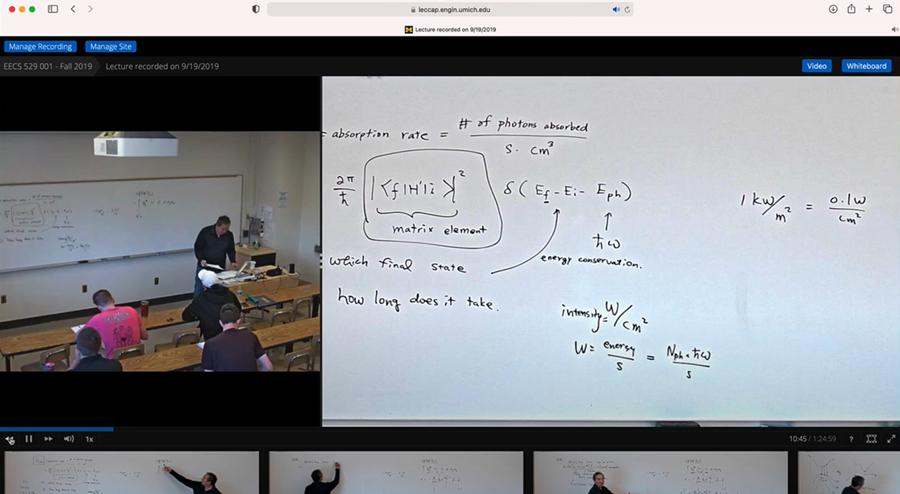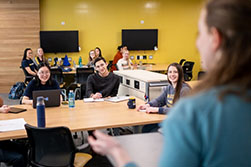
Still in the midst of a pandemic, you may be wrestling with the question of whether or not to record your lectures. On the one hand, recordings provide a simple way for students to catch up if they become sick. On the other hand, you may worry about student learning or about teaching in an almost empty classroom. You are not alone.
Concerns about the effects of lecture capture on attendance and learning have existed since its inception. While some studies find that lecture attendance does indeed decrease slightly when lecture capture is introduced, many others show no significant effects. The relationship between lecture capture, attendance and student achievement is complex and shows different patterns for different groups of students (e.g. Banerjee, 2020).
Nordmann et al. (2021) postulate that "… many of the concerns regarding lecture capture are, at their core, concerns about study strategies and self-regulation" and that "a large part of the driving force behind the controversy may stem from a lack of concrete guidance for how to maximize the pedagogic value of recordings."
Examining student behavior, we see that many students still attend class and use the recordings to complete and improve their notes. This finding from the literature was recently confirmed in a study of engineering students at UM (Finelli, et al, 2021). Taking good notes in a lecture requires a lot of concentration and effort, and students often miss information. Recorded lectures provide a means to recover such information. Many students rewatch parts of lectures to study for their exams. As such, lecture recordings offer an additional resource for students to interact with the course materials. This resource provides flexibility for students who are ill and cannot attend class, students who have competing courses on their schedule, students who struggle with the timing of the lectures, or students who may have difficulty keeping up with a live lecture. The added flexibility helps to create more inclusive and equitable classrooms.
There are some students, however, for whom lecture capture creates a lack of urgency to actually attend class. This group might procrastinate doing the work and binge-watch the lectures shortly before the exams. These students tend to perform poorly, as research shows that successful students spread out their studying and put in prolonged efforts to master their coursework. Before deciding not to record your lectures, consider guiding students on how they can benefit most from this additional resource you can provide.
Strategies:
- Clarify the role of lecture recordings in your class. Are they supplemental to class attendance? If so, explain why being in class is important for learning.
- Ask yourself (and your students) why they might not attend lectures. What does in-person attendance offer that a video recording does not?
- Share research showing that attendance and achievement are correlated (e.g., Samson, 2020).
- Find ways to energize your lectures and create opportunities for interaction and collaboration. For example, consider active learning strategies, and examine best-practices for flipping part of your lectures.
- Invest time in building community to increase the social benefits of attending class. Be available for students after class and in office hours to answer their questions and respond to concerns.
- Check-in with students who are only watching class recordings.
- Explain how to use recorded lectures for learning. Most students do not know by default how to put the recorded lectures to their best use. Use this guide for students.
- Organize your Canvas module in such a way students easily see the structure and find their way to the available materials.
CAEN's Lecture Capture system is available in all classrooms at the College of Engineering, most classrooms in LSA, and other units throughout the university. You can also record classes that are being live streamed with Zoom. Finally, consider recording short videos explaining difficult concepts or providing additional examples for your students. These strategies can help you maximize the benefits of recorded lectures while avoiding the pitfalls of greatest concern to instructors.
References
Banerjee, S. (2021). To capture the research landscape of lecture capture in university education. Computers and Education, 160(May 2020), 104032. https://doi.org/10.1016/j.compedu.2020.104032
Finelli, C., Millunchick, J. M., Jeeping, D., & Van den Bogaard, M. (2021) Understanding and mitigating the effect of COVID-19 on the engineering undergraduate student experience, in progress.
Graves, L., Asunda, P. A., Plant, S. J., & Goad, C. (2011). Asynchronous Online Access as an Accommodation on Students with Learning Disabilities and/or Attention-Deficit Hyperactivity Disorders in Postsecondary STEM Courses. Journal of Postsecondary Education & Disability, 24(4), 317–330.
Luo, Y., Pan, R., Choi, J. H., & Strobel, J. (2018). Effects of Chronotypes on Students’ Choice, Participation, and Performance in Online Learning. Journal of Educational Computing Research, 55(8), 1069–1087. https://doi.org/10.1177/0735633117697729
Nordmann, E., Calder, C., Bishop, P., Irwin, A., & Comber, D. (2019). Turn up, tune in, don’t drop out: the relationship between lecture attendance, use of lecture recordings, and achievement at different levels of study. Higher Education, 77(6), 1065–1084. https://doi.org/10.1007/s10734-018-0320-8
Nordmann, E., Küepper-Tetzel, C. E., Robson, L., Phillipson, S., Lipan, G. I., & McGeorge, P. (2020). Lecture capture: Practical recommendations for students and instructors. In Scholarship of Teaching and Learning in Psychology. https://doi.org/10.1037/stl0000190
Samson, P. J. (2020) Student behaviors in a blended synchronous course. Journal of Geoscience Education, 68(4), 324-333. DOI: 10.1080/10899995.2020.1768002
By Maartje Van den Bogaard, Research Fellow, Engineering Education Research Grenmarie Agresar, Assistant Director for Strategic Initiatives, CRLT in Engineering
- Log in to post comments
- 990 views







michaelrobert6456@gmail.com
The World News
Wed, 06/29/2022 - 11:59amThe Latest News blogs